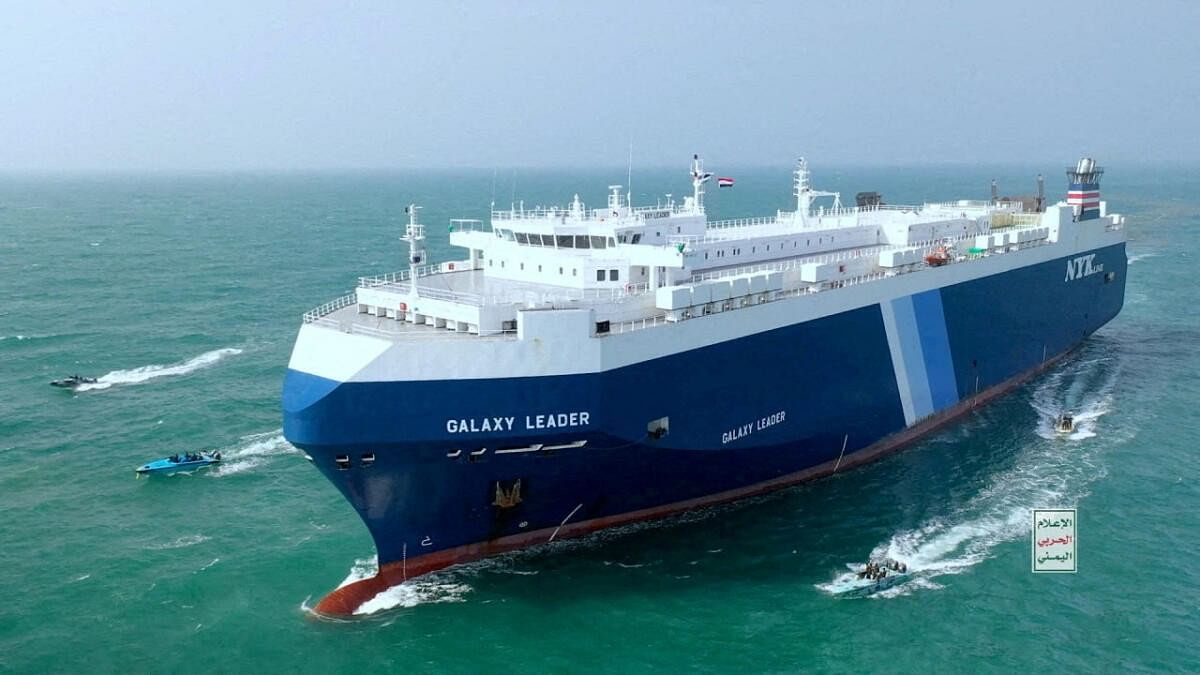
The Galaxy Leader cargo ship is escorted by Houthi boats in the Red Sea in this photo released November 20, 2023.
Credit: Media handout via Reuters
The Iran-backed Houthi rebels' attack on commercial vessels recently have resulted in many firms deciding to avoid one of the world's busiest shipping routes.
The Yemen-based Houthi group has declared its support for Hamas in Gaza and claimed that it is attacking ships that are en route to Israel.
However, it is not clear yet whether all the ships attacked by the Iran-backed militia outfit were actually heading to Israel, reported BBC.
Houthis have been using rockets and drones against foreign-owned containers transporting goods through the strait of Bab al-Mandab - a 20-mile wide channel that splits Eritrea and Djibouti on the African side and Yemen on the Arabian Peninsula. That rendered the Suez Canal, which is key to global commerce, unusable for most routes.
Meanwhile, Denmark's Maersk is preparing to resume shipping operations in the Red Sea and the Gulf of Aden, the company said on Sunday, citing the deployment of a US-led military operation designed to ensure the safety of commerce in the area.
The shipping giant paused sending vessels through the Bab el-Mandeb strait earlier in December due to attacks against its ships.
The United States said on Tuesday it was launching a multinational operation to protect commerce in the Red Sea from the Houthis.
"As of Sunday 24 December 2023, we have received confirmation that the previously announced multi-national security initiative Operation Prosperity Guardian (OPG) has now been set up and deployed to allow maritime commerce to pass through the Red Sea/Gulf of Aden and once again return to using the Suez Canal as a gateway between Asia and Europe," Masersk said in a statement on Sunday.
Russia-Ukraine war impact
Similarly, if we talk about the consequence of Russia-Ukraine war on global trade, the outcome is as concerning. The devastating war between the two countries directly affected maritime transport in Azov and Black Seas, including a halt of the activities in Ukrainian ports and the export of agricultural products.
Ukraine’s major ports, including that of Odessa, were closed due to the conflict and a Russian naval blockade of Ukraine. The country ships over 70 per cent of its exports, including 99 per cent of its corn exports. Hundreds of vessels were trapped in ports or were anchored while thousands of Russian and Ukrainian crew members faced an uncertain future, unable to leave vessels or return home.
Many western firms voluntarily opted to cease trade ties with Russia, creating an uncertain and complex situations for contracts, including insurance.
How will this impact global trade and shipping industry?
As per experts, some Israeli-linked ships have started taking the South African route to avoid the Houthi menace. This delays the duration of the trip to 31 days from the usual 19 days, adding to the costs and logistical woes.
Meanwhile, the global oil market has downplayed the recent attacks. Crude oil prices have dipped and the market looks more worried about the drop in demand among advanced economies. However, the major impact that the Houthi escalation has caused is the increased insurance costs for the shipping firms, reports VOA News.
Insurance costs have more than doubled for ship operators navigating through the Red Sea, which can add to thousands of dollars for the most expensive ships, said David Osler, insurance editor for Lloyd's List Intelligence.
While shippers are applying a so-called war risk charge of $50 to $100 per container to customers bringing over everything from grain to oil to things you buy off Amazon, that's a low enough fee that it should not drive up prices for consumers, Osler said.
Osler expects insurance costs to keep rising but said the situation would have to get a lot worse — such as the loss of several ships — to raise prices considerably and make some ship owners rethink moving through the region.
(With inputs from Reuters, BBC, OECD, UNCTAD)